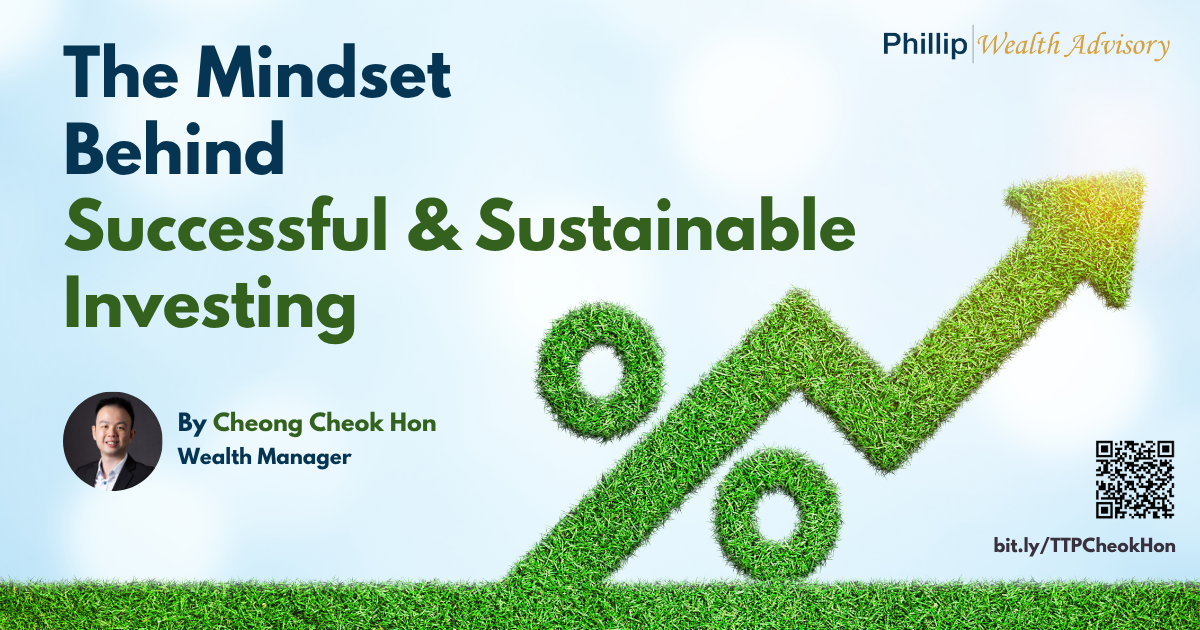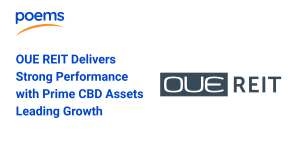The Mindset Behind Successful and Sustainable Investing July 29, 2025

A smart investor needs to have a PhD to invest — Patience, Humility, and Discipline. Investing may not require a formal PhD, but it does demand a disciplined mindset and a long-term perspective. This article seeks to educate readers on how to cultivate a mindset for enduring investment success.
As a financial intermediary, one of the most common questions I have received is, “What’s good to invest in now?” While a typical recommendation might be to invest in a blue-chip stock or an index, this merely scratches the surface of what it truly takes to invest successfully. In this article, I aim to share my beliefs on what investing truly entails, debunk some common misconceptions, and unpack the mindset that every investor should cultivate for long-term success.
As Wealth Managers, we regularly engage with both retail and professional investors. Within the industry, investing is broadly understood as a method for capital providers to grow their wealth over the long term. It is worth highlighting that this long-term period has weathered episodes of extreme health, financial, and geopolitical crises – from COVID-19 to the Great Financial Crisis, and even the Cold/World Wars. Despite these major global disruptions, the average long-term returns from investing in well-diversified and quality portfolios tend to be in excess of 6% such as the popular S&P 500 1 or the more familiar Straits Times Index 2. Hence, it should also be noted that a return profile can be affected by factors such as the starting and ending points, growth expectations, market positioning, sentiments, and so on. Nonetheless, for investors who remain committed, there is a reasonable likelihood of achieving a real wealth increase of 4% or more in an environment where inflation averages 2% per annum, a level targeted by many central banks globally.3
To illustrate further, in an environment where inflation averages 4% annually—as has been the case recently in the United States, a well-constructed portfolio generating returns of 9% per annum would still result in a real wealth increase of approximately 5% annually.4 Over time, this will lead to a substantial growth in wealth that can be used to supplement one’s retirement, spending, or bequest requirements.

Beyond the hard numbers, it is also worth highlighting that investing closely aligns with the essence of capitalism. While capitalism is not without its downsides such as creative destruction, inequality, and a hyper-competitive environment—private capital, razor-focused on profits and growth, it is widely believed to be more effective at identifying superior companies. Ultimately, capitalism creates positive outcomes for all parties involved: better governance and innovation; greater efficiency, productivity, and profitability for the enterprises; wealth, income, and increased purchasing power for private capital providers. Professional investors contribute to this process by analysing business models, competitive advantages, management capabilities, and so on. For example, investors play a role in the financial ecosystem that helps identify and fuel the strategies, talent acquisition, R&D, and production of ground-breaking products and services – such as the iPhone and Netflix – that we, along with the rest of the world, enjoy as consumers.
Eventually, great products and services that meet market demand drive l profits and stock prices, resulting in extremely rewarding outcomes for those who invest and hold on. Therefore, rather than view investing as opportunism, greed, a zero-sum game, or reckless risk-taking, bona fide investing is, in fact, a positive-sum game. Skillful investors continually seek out excellent companies that are able to compete, innovate, and grow market share, cash flow and profit in the long-term. By understanding their constructive role in this broader purpose, I trust that investors will be better able to stay the course.
That said, many misperceptions about investing still persist. For instance, I have observed some “investors” treating investing as a way to prove themselves right – or even worse, as an entertaining punt or thrill-seeking activity. Some investors also neglect proper due diligence, relying solely on news headlines or hearsay, and end up disappointed when the outcome doesn’t meet their expectations. This might not be the best mindset to understand and approach investing with, as the probability of making sustainable returns under such conditions is unlikely to be high. I have also encountered common refrains such as “Got risk, right?”, “So good – is this a scam?”, or “I don’t understand, I’m not interested”, – all of which reflect some degree of fear or skepticism around investing. While understandable, such attitudes may cause individuals to miss out on opportunities to grow their hard-earned savings over the long-term – especially when investing is done properly.

Finally, investors should not confuse investing with trading – a common mistake. Trading relies on swift and precise entries and exits to capture quick profits. In trading, timing is key, whereas in investing, it is the time in the market that drives results. These are two entirely different strategies.
In sum, investing is simply a means of using capital to achieve financial ends such as retirement or asset growth. With a responsible approach and advice, it should not be feared or avoided.
To fully reap the potential benefits of investing, I believe investors should at the very least embody three key attributes — Patience, Humility, and Discipline — which together form what I refer to as the P.H.D. mindset.
Patience
Warren Buffet once said that the stock market is a mechanism to transfer money from the impatient to the patient. Patience, or more specifically, understanding the long-term nature of investing and not blindly holding onto poor-quality companies in hope is one of the most important attributes an investor can possess. As highlighted in detail earlier, for fundamentally sound companies, their operational and financial performance tends to revert to the mean over the long term, leading to gradual asset growth for the patient investor. By adopting a patient mindset, investors can also reduce the risk of falling prey to investment scams. When investing, a tip for investors is to hold sufficient cash for liquidity – at least 3-6 months’ worth of emergency funds. This buffer reduces the pressure to liquidate investments prematurely, allowing the investor to ride out market volatility with greater confidence.
Humility
There is a saying that diversification is the acknowledgment that one does not know everything. While there are exceptional investors, most, including professional fund managers, benefit from maintaining a well-diversified portfolio. It is impossible to predict every market movement or macroeconomic shock. For example, not many could have foreseen the anomalous housing price spike in Singapore driven by supply chain issues during COVID-19, let alone predict the pandemic itself. By staying well-diversified, investors can build portfolios that grow at their potential while avoiding over-concentration in any single asset. This helps to reduce volatility, manage risk and enhance overall resilience especially during market shocks or individual business failures, making the investment experience more bearable and sustainable. Lastly, by being humble and cognisant of one’s strengths and limitations, continuously seeking knowledge, and keeping abreast about developments related to one’s investments, a well-informed investor stands a much better chance of weathering the markets and profiting over the long haul.
Discipline
Discipline is arguably the hardest trait to master. It requires tuning out market noise, both euphoric and pessimistic and focusing on the structural factors that truly drive long-term investment value. As we’ve recently seen, after wild swings, most market indices have recovered to settle around the same level pre-Liberation Day, leading to numerous quips that inaction is sometimes the best course of action. On the other hand, if fundamentals of an investment do change, investors have to be disciplined and rebalance appropriately even when it is painful. For instance, the rise of ride-hailing apps and digital media brought immense operating pressures structurally even for local stock market stalwarts like SPH and ComfortDelGro, contributing to significant declines in their financial performance and share prices. When investing, investors should always strive to be disciplined, do their due diligence and maintain conviction in their investment thesis, even when it diverges from the prevailing market narrative or cycle. Ideally, they should reach a level of self-awareness where they recognise what they do not know and are open to seeking support from a trusted adviser or family member to stay on course.
It is also important to note that while the philosophy of investing sounds easy, execution is certainly harder in reality. For instance, different fund houses adopt varying equity styles and strategies, such as growth, value, momentum, quality, defensive, and so on, and these approaches perform differently depending on the economic and interest rate cycle. Likewise, different sectors, such as property and manufacturing, are also commonly valued and priced using different metrics. When it comes to fixed income investments, managers look at a whole different set of indicators such as default rates, credit ratings, yield spreads, and so on. Moreover, these data evolve in real-time and can be tedious to track and monitor, let alone assess, compare, and act upon effectively.
The average investor typically does not have the same depth of expertise, resources, or access to real-time analytics as professional money managers. Many also struggle with emotional management — for example, selling sound investments during short-term downturns due to panic or fear, potentially to their detriment.
In conclusion, investing may not be for everyone. Whether due to individual risk tolerance or a preference for relying on proven traders. However, for those who wish to take their excess savings seriously and invest with purpose, it is important to first assess whether they have the emotional resilience, knowledge, capability, time, and resources to do so effectively. Otherwise, partnering with a trusted financial services provider may be the most effective approach towards maximising one’s investment potential while staying aligned with long-term goals.
Contributor:

Cheong Cheok Hon
Wealth Manager
Phillip Securities Pte Ltd (A member of PhillipCapital)
http://bit.ly/TTPCheokHon
Appendix:
- [1] https://www.investopedia.com/ask/answers/042415/what-average-annual-return-sp-500.asp
- [2] https://thesmartinvestor.com.sg/sti-etf-10-must-know-facts-you-should-learn-before-you-buy/
- [3] https://www.mas.gov.sg/monetary-policy/Singapores-Monetary-Policy-Framework/faqs/section-1
- [4] https://www.investopedia.com/inflation-rate-by-year-7253832
Disclaimer
These commentaries are intended for general circulation and do not have regard to the specific investment objectives, financial situation and particular needs of any person. Accordingly, no warranty whatsoever is given and no liability whatsoever is accepted for any loss arising whether directly or indirectly as a result of any person acting based on this information. You should seek advice from a financial adviser regarding the suitability of any investment product(s) mentioned herein, taking into account your specific investment objectives, financial situation or particular needs, before making a commitment to invest in such products.
Opinions expressed in these commentaries are subject to change without notice. Investments are subject to investment risks including the possible loss of the principal amount invested. The value of units in any fund and the income from them may fall as well as rise. Past performance figures as well as any projection or forecast used in these commentaries are not necessarily indicative of future or likely performance.
Phillip Securities Pte Ltd (PSPL), its directors, connected persons or employees may from time to time have an interest in the financial instruments mentioned in these commentaries.
The information contained in these commentaries has been obtained from public sources which PSPL has no reason to believe are unreliable and any analysis, forecasts, projections, expectations and opinions (collectively the “Research”) contained in these commentaries are based on such information and are expressions of belief only. PSPL has not verified this information and no representation or warranty, express or implied, is made that such information or Research is accurate, complete or verified or should be relied upon as such. Any such information or Research contained in these commentaries are subject to change, and PSPL shall not have any responsibility to maintain the information or Research made available or to supply any corrections, updates or releases in connection therewith. In no event will PSPL be liable for any special, indirect, incidental or consequential damages which may be incurred from the use of the information or Research made available, even if it has been advised of the possibility of such damages. The companies and their employees mentioned in these commentaries cannot be held liable for any errors, inaccuracies and/or omissions howsoever caused. Any opinion or advice herein is made on a general basis and is subject to change without notice. The information provided in these commentaries may contain optimistic statements regarding future events or future financial performance of countries, markets or companies. You must make your own financial assessment of the relevance, accuracy and adequacy of the information provided in these commentaries.
Views and any strategies described in these commentaries may not be suitable for all investors. Opinions expressed herein may differ from the opinions expressed by other units of PSPL or its connected persons and associates. Any reference to or discussion of investment products or commodities in these commentaries is purely for illustrative purposes only and must not be construed as a recommendation, an offer or solicitation for the subscription, purchase or sale of the investment products or commodities mentioned.
This advertisement has not been reviewed by the Monetary Authority of Singapore.
About the author
Cheong Cheok Hon
Wealth Manager
Phillip Securities Pte Ltd
Cheok Hon is a Wealth Manager at Phillip Securities with extensive experience in advising on insurance and investment products. He is dedicated to using his expertise and knowledge to become a trusted partner and advisor on his clients' personal finance journey. In his free time, he enjoys reading articles related to current affairs and finance.

 Singapore Equities Hit New Highs in Record Nine-Month Rally
Singapore Equities Hit New Highs in Record Nine-Month Rally  OUE REIT Posts Strong Performance as Prime CBD Assets Drive Growth
OUE REIT Posts Strong Performance as Prime CBD Assets Drive Growth  Tesla Faces Delivery Challenges as EV Tax Credits Are Removed
Tesla Faces Delivery Challenges as EV Tax Credits Are Removed  Reddit Inc.: Transforming Community Engagement into Revenue Growth
Reddit Inc.: Transforming Community Engagement into Revenue Growth 






